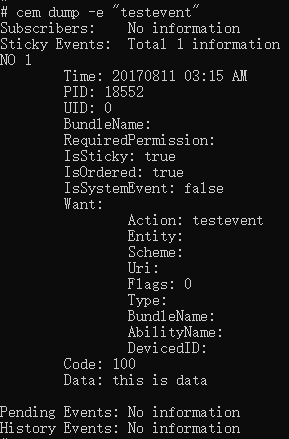Common Event Manager
The Common Event Manager enables you to print common event information and publish common events. It provides the common event debugging and testing capabilities, for example, printing all public event subscribers, sent public events, and recipients, and simulating public event release.
NOTE
Before using this tool, you must obtain the hdc tool and run the hdc shell command.
Commands
help
-
Function
Prints help information.
-
Method
cem help
publish
-
Function
Publishes a common event.
-
Method
cem publish [<options>]The table below describes the available options.
| Name | Description |
|---|---|
| -e/--event | Name of the common event to publish. Mandatory. |
| -s/--sticky | Indicates that the common event to publish is sticky. Optional. By default, non-sticky events are published. |
| -o/--ordered | Indicates that the common event to publish is ordered. Optional. By default, non-ordered events are published. |
| -c/--code | Result code of the common event. Optional. |
| -d/--data | Data carried in the common event. Optional. |
| -h/--help | Help information. |
-
Example
# Publish a common event named testevent. cem publish --event "testevent"
# Publish a sticky, ordered common event named testevent. The result code of the event is 100 and the data carried is this is data. cem publish -e "testevent" -s -o -c 100 -d "this is data"
dump
-
Function
Displays information about common events.
-
Method
cem dump [<options>]The table below describes the available options.
| Name | Description |
|---|---|
| -a/--all | Information about all common events that have been sent since system startup. |
| -e/--event | Information about a specific event. |
| -h/--help | Help information. |
-
Example
# Display details of a common event named testevent. cem dump -e "testevent"